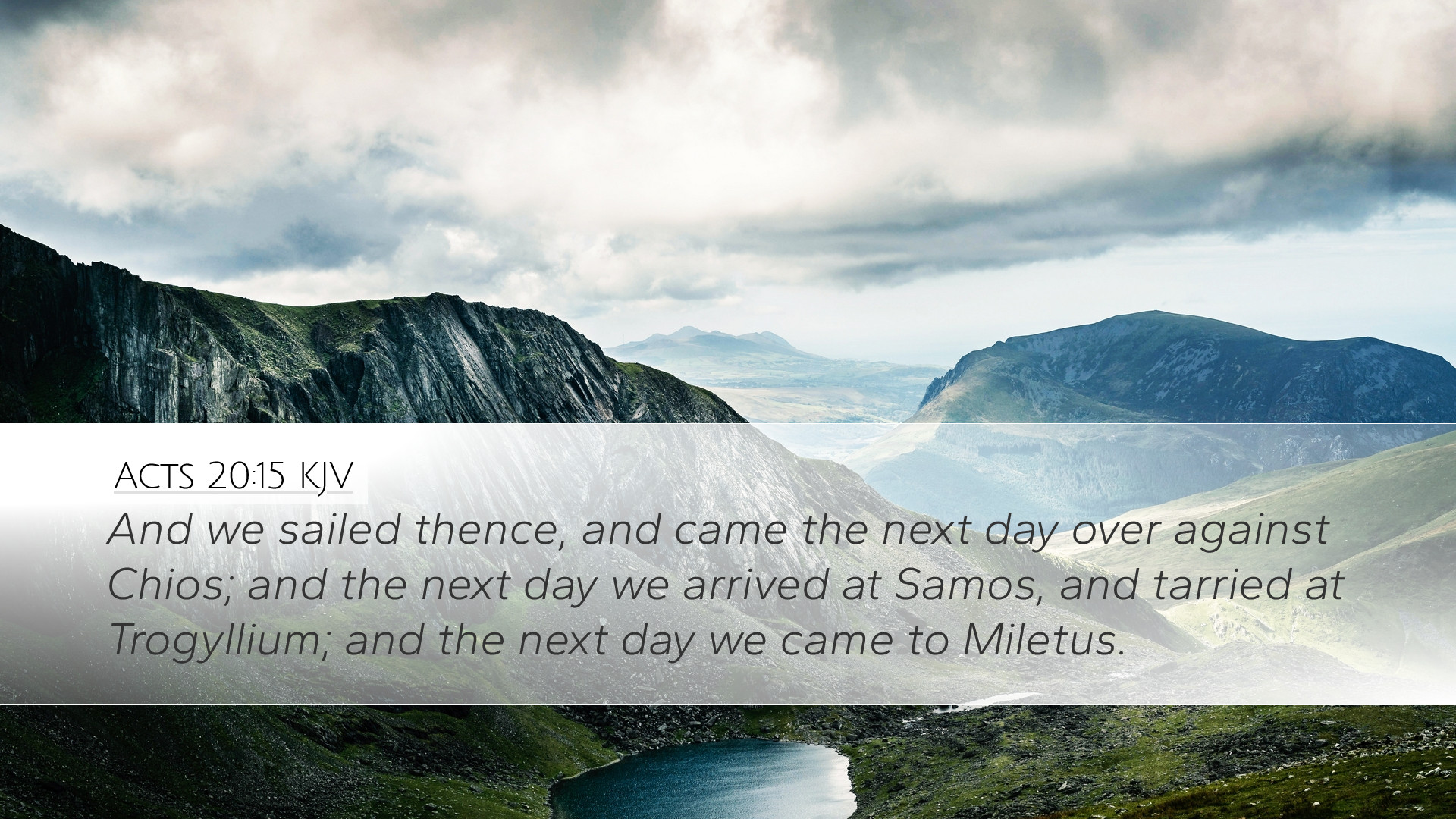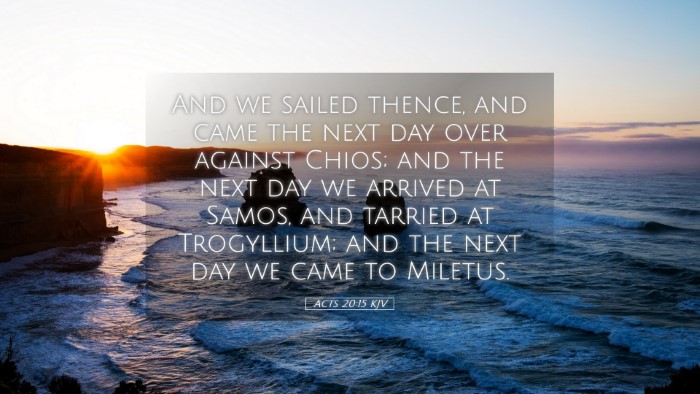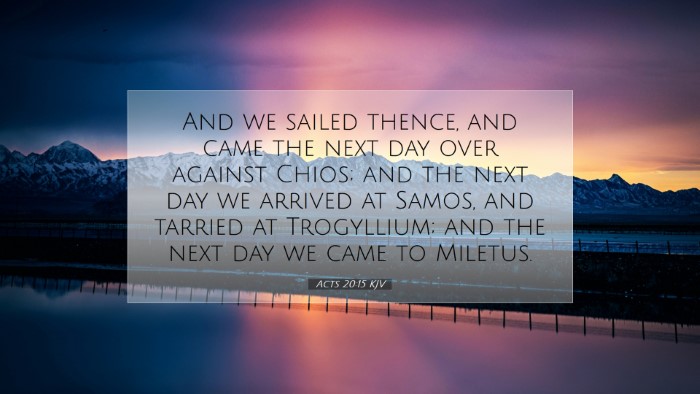Commentary on Acts 20:15
Acts 20:15 states:
“And we sailed from there and came the next day opposite Chios. The following day we touched at Samos, and the day after that we came to Miletus.”
Overview
This verse is situated in the context of Paul’s third missionary journey and his determination to reach Jerusalem. The mention of the locations—Chios, Samos, and Miletus—presents a geographical framework that highlights the various activities and interactions during Paul’s journey. Through examining this passage, we can engage with insights from historical, theological, and practical perspectives.
Geographical Insights
The locations mentioned in Acts 20:15 are significant in understanding the route of Paul’s journey:
- Chios: An island significant for trade and culture, Chios played a vital role in maritime navigation. This location reflects the extensive network of travel during the time of the Apostles.
- Samos: Another island, Samos was known for its rich history in philosophy, particularly as the birthplace of Pythagoras. Paul's stop here may symbolize the dissemination of the Gospel to regions influenced by great thinkers.
- Miletus: This was an important ancient city, serving as a seaport and a hub of commerce. It is in Miletus that Paul famously calls the Ephesian elders, marking a poignant moment of farewell and instruction.
Theological Reflections
From a theological perspective, Acts 20:15 demonstrates Paul's commitment to his mission. His travel itinerary underscores a life dedicated to spreading the Gospel:
- A Sense of Urgency: Paul is eager to reach Jerusalem, indicative of his deep desire to fulfill the calling God has placed upon him. This is a poignant reminder for believers to prioritize their spiritual calling and the mission entrusted to them.
- Community and Fellowship: The mention of companions in the travel narrative suggests the importance of community in ministry. Paul traveled with others, symbolizing fellowship and mutual encouragement in the Gospel work.
- God’s Sovereignty: The journey details point to God’s providential guidance over Paul’s life. Despite the challenges and opposition he faced, Paul continues to progress, affirming the belief that God orchestrates the paths of His servants.
Insights from Public Domain Commentaries
Matthew Henry
Matthew Henry emphasizes the providential leading of Paul. He notes that every step of Paul's journey was guided by the Holy Spirit. Henry points out that Paul's method involved thorough planning and careful execution, yet it was always underpinned by prayer and dependence on divine guidance. This underscores a lesson in balancing human responsibility with reliance on God.
Albert Barnes
Albert Barnes offers valuable commentary on the relationships established along Paul's voyage. He denotes that the different locations highlight not only the strategic nature of Paul's ministry but also the necessity of forming connections during travels. Each stop allowed for the potential for teaching, mentoring, and building up the Church. Barnes accentuates that one of the key aspects of ministry is consistent engagement with communities, furthering the message of Christ.
Adam Clarke
Adam Clarke expands upon the significance of Miletus in particular. He marks it as a notable stop due to its centrality in the Ephesian Church's development. Clarke points out that Paul’s encounter with the elders here reflects his pastoral heart. It serves as a model for pastor-teacher relationships, embodying a call for transparency, accountability, and encouragement in the ministry. Clarke encourages ministers today to heed Paul’s example of leadership—a ministry grounded in love, care, and a clear sense of direction.
Practical Applications
The practical implications of Acts 20:15 resonate with contemporary church leaders, pastors, and theologians. Here are several applications that emerge from this passage:
- Intentionality in Ministry: Just as Paul was intentional about his journey, modern believers are encouraged to approach their own ministries with purpose and clarity, continually seeking God’s direction.
- Building Relationships: The necessity of forming deep, meaningful relationships within the body of Christ is brought to the forefront. Paul’s interactions reinforce the idea that ministry flourishes within the context of community.
- Embracing God’s Leading: A significant takeaway is to remain sensitive to the Holy Spirit’s guidance in both planning and executing one’s personal ministry. Whether in transient experiences like Paul’s or in established roles, recognizing God's handiwork is crucial.
- Preparation and Reflection: Pastors and leaders should cultivate a lifestyle of both preparation and reflection. By being equipped and reflective, they can respond to new situations and opportunities as they arise.
Conclusion
Acts 20:15 provides a profound glimpse into the life of the Apostle Paul, showcasing his commitment to the Gospel and the significance of each step in his missionary journey. By integrating the insights of foundational commentaries, we can appreciate the rich theological, historical, and practical lessons this verse imparts. As we engage with the text, may we be encouraged and inspired to pursue our walk with God, ever aware of His guiding hand.


